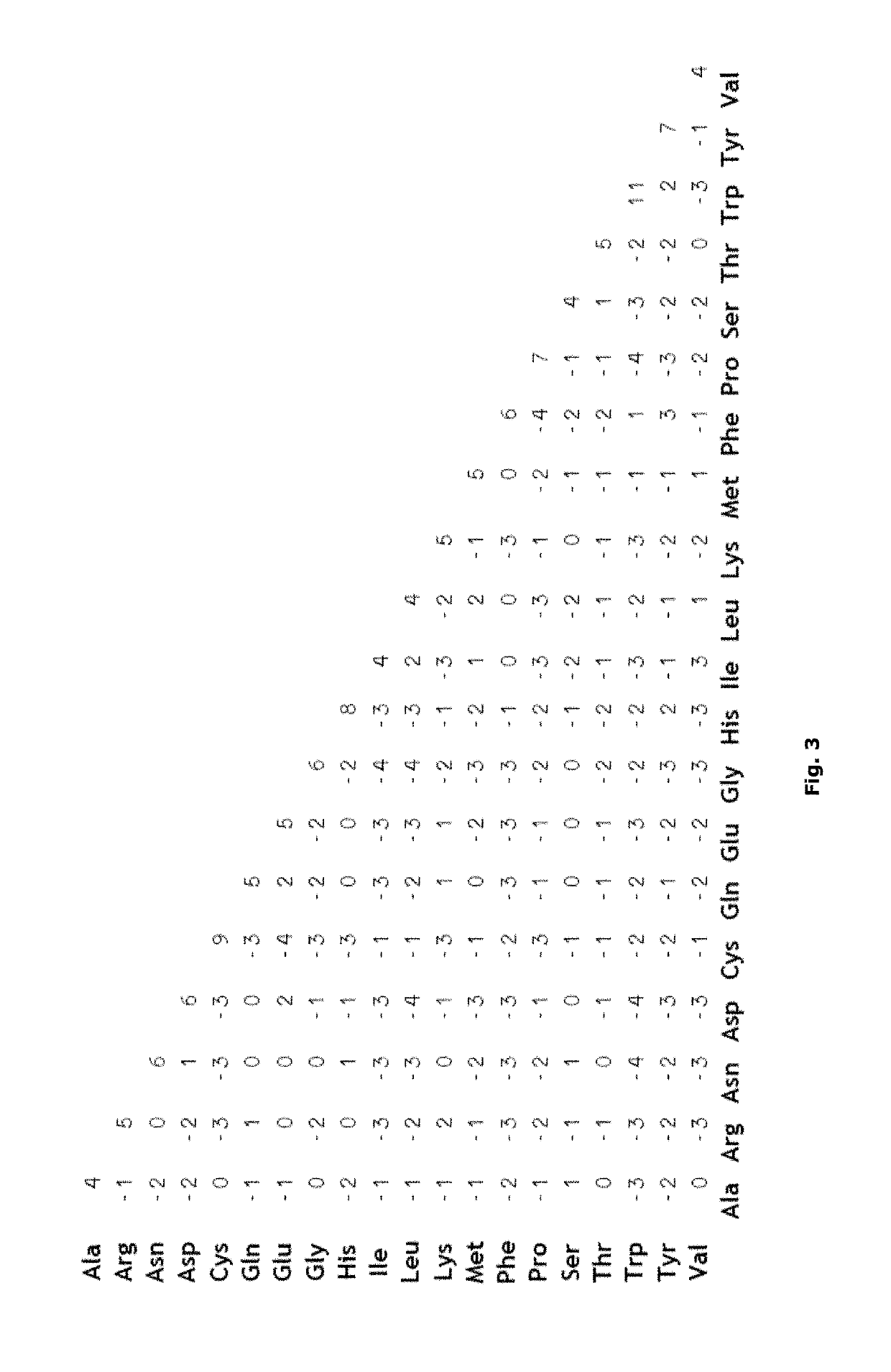Alignment method for nucleic acid sequences
- Summary
- Abstract
- Description
- Claims
- Application Information
AI Technical Summary
Benefits of technology
Problems solved by technology
Method used
Image
Examples
example 1
rogramming Algorithm
[0106]In this example, a preferred embodiment of a dynamic programming algorithm according to the present invention is disclosed in detail.
[0107]A reference nucleic acid sequence G=g1g2 . . . gM and a query nucleic acid sequence B=b1b2 . . . bN are provided in digital format.
[0108]The induction state ISm,n comprises eight scalars:
ISm,n=[Dm,n;Mm,n;P(1)m,n;P(2)m,n;P(3)m,n;Q(1)m,n;Q(2)m,n;Q(3)m,n].
[0109]For an alignment of g1g2 . . . gm with m≤M and b1b2 . . . bn with n≤N:[0110]Dm,n is the best partial alignment score;[0111]Mm,n is the best score for an alignment ending with a substitution;[0112]p(g)m,n is the best score for an alignment ending with a gap of length k=3i+g after gm in the reference sequence, with i a non-negative integer and g equal to 1, 2 or 3; and[0113]Q(h)m,n is the best score for an alignment ending with a gap of length k=3j+h after bn in the query sequence, with j a non-negative integer and h equal to 1, 2 or 3.
[0114]At each induction step m, n...
example 2
ation
[0131]Example 2 concerns the implementation and provision of a dynamic programming algorithm according to the present invention. Example 2 thereby preferably extends upon the dynamic programming algorithm outlined in example 1, but may also concern other implementations of dynamic programming algorithms according to the present invention.
[0132]The dynamic programming algorithm may be implemented as a standalone command-line tool in any known programming language. A non-limiting list of programming languages comprises C, C++, Java, Fortran, Pascal, and the like. Preferably, the standalone command-line tool is implemented in C++ 11.
[0133]The dynamic programming algorithm may additionally or alternatively be provided as a web application utilizable via a web interface which is accessible via a web browser and an Internet connection. The web interface may be implemented in html. The web interface may be configured to obtain input parameters, a query sequence, and a reference sequen...
example 3
arameters
[0136]Example 3 concerns example parameters for the dynamic programming algorithm as outlined in example 1, and which may be implemented according to the provisions of example 2. They may be passed to the standalone command-line tool according to example 2 as command-line parameters.
[0137]An example set of parameters for the nucleic acid alignment score is:[0138]pv,na=−10[0139]pu,na=−1[0140]Wna=+2 for a match of nucleic acids, and −2 for a mismatch of nucleic acids
[0141]An example set of parameters for the amino acid alignment score is:[0142]waa=1[0143]pv,aa=−6[0144]pu,aa=−2[0145]Waa=BLOSUM62[0146]pf=−100[0147]pm=−20
[0148]BLOSUM is an abbreviation for BLOcks Substitution Matrix for the sequence alignment of proteins via pairwise amino acid substitution. They were first described in “Amino Acid Substitution Matrices from Protein Blocks”, written by S. Henikoff and J. G. Henikoff, published in PNAS 89(22), 10915-10919 (1992), doi: 10.1073 / pnas.89.22.10915.
[0149]Examples of BL...
PUM
 Login to View More
Login to View More Abstract
Description
Claims
Application Information
 Login to View More
Login to View More - R&D
- Intellectual Property
- Life Sciences
- Materials
- Tech Scout
- Unparalleled Data Quality
- Higher Quality Content
- 60% Fewer Hallucinations
Browse by: Latest US Patents, China's latest patents, Technical Efficacy Thesaurus, Application Domain, Technology Topic, Popular Technical Reports.
© 2025 PatSnap. All rights reserved.Legal|Privacy policy|Modern Slavery Act Transparency Statement|Sitemap|About US| Contact US: help@patsnap.com



